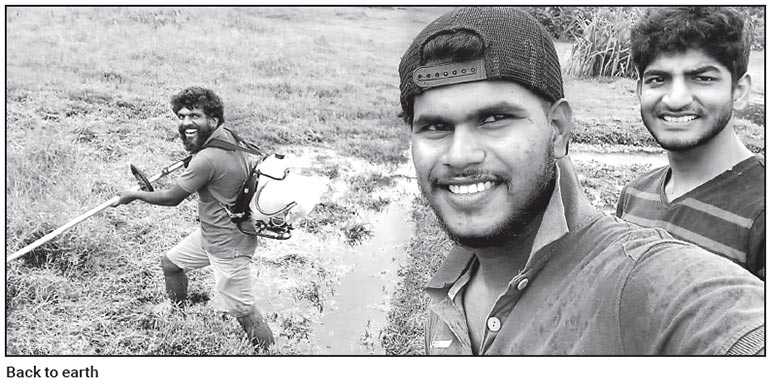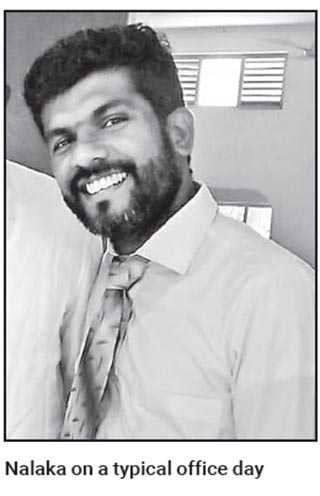Tuesday Feb 24, 2026
Tuesday Feb 24, 2026
Saturday, 21 December 2019 00:05 - - {{hitsCtrl.values.hits}}

One young man from the city proves how one can find meaning in life, at a very affordable cost
By Chandrika Gadiewasam
Nalaka Priyadarshana works a regular nine-to-five job in the chaos of Colombo, facing the usual problems of noisy traffic, clogged drains and urban stress that is the hallmark of life of young urban professionals in any Asian megacity. 
He previously trained as a software engineer but found it too addictive for his liking and then switched to accountancy, and now works at a leading research centre in the Sri Lankan capital. However, when the number-crunching gets too tedious, he has found a rewarding hobby that removes him from city stress and strife: he dons a pair of shorts, an old shirt and a large hat and picks up a shovel to attend to his rice field in Meegoda, about an hour away from Colombo.
“You may think this is unusual and impossible but I want to show young people that in any circumstance you have a choice,” he says, “This is not rocket science, it is very doable.”
He stands knee-deep in an undulating expanse of green which will soon provide a harvest of rice. “This was a wonderful learning experience and a chance to prove to myself that I could indeed do something I set my mind to.”
"You may think this is unusual and impossible but I want to show young people that in any circumstance you have a choice. This is not rocket science, it is very doable. This was a wonderful learning experience and a chance to prove to myself that I could indeed do something I set my mind to"
Friends and relations at first scoffed that a city boy who knew nothing about agriculture could reach any practical result agriculturally, on an acreage of land. Nalaka approached his project in a methodical way similar to a computer program, but the journey, as he reveals, was amazing.
“I met so many wonderful people, mostly elders in the area who wanted to support me, and they were very happy that a young person was showing interest in agriculture when their own children have mostly moved out of the village and are suffering in the towns and cities looking for jobs.
“These elders helped me by educating me about what I should do, what grains I should go for and when I should best attend to the various stages of the process.”
Rice seeds have to be soaked in water for exactly a day, then they are taken out of the water and kept closed with weights on them for three days, during which they germinate. Sri Lanka generally has two rice seasons (called Yala and Maha) lasting approximately four months, beginning with the ploughing followed by the sowing period where the rice seedlings are spread.
If the ground seems to be lacking in fertility, organic fertilisers can be spread on the land and there are traditional methods of fertilising the soil. Within 14 days another round of organic fertiliser should be administered. If any intruding wild (parasitic plants have appeared) they can be manually extracted, and a manner of weedicide should be administered which can be made organically, he stresses.
Nalaka’s rural neighbours did their best to support his endeavour and his friends pitched in at ploughing and seeding times.
“It was great fun, a picnic in nature,” he recalls, “I would cook for everyone on a portable stove and we would spend the whole day in the field, you know how that kind of food always tastes the best...”
"People, elders, society tells you that you have to do certain things, get an education, go find a job in the city, get promoted, get married, and so many other societal expectations, to be successful. So youth become like rats in a race to get these ambitions fulfilled, and they are suffering. When they are unhappy with all this stress and life becomes devoid of deeper meaning, they turn to alcohol, overeating and social media addictions to try to find happiness. The result is not happiness but more frustration"
Three friends from various backgrounds joined to help on the weekends, from which Nalaka recounts all of them emerged sore but very happy.
“Some people go to the gym. I do not need to. This is my workout,” he quips.
Nalaka’s agricultural pursuit is beginning to show results, with the expanse of seedlings in first sprout, a magical sight for any would-be planter. However he has experienced a few setbacks, as anyone initiating a new venture would. Due to office deadlines, he was a couple of weeks late in seeding the field which had resulted in flocks of parrots eating off some parts of it!
“Birds have to share this earth with us and they have to eat too,” he states, revealing his connectedness to other living beings that make up the eco system. However, despite the initial setback, the rains had descended on time and the agricultural process is going according to plan.
For Nalaka, the city accountant, whether or not he reaps a full harvest, the vital initiative he took has great meaning to his life.
Nalaka laments on the way people do not value agriculture, or healthy homegrown and homemade food anymore and instead try to find fulfilment in instant noodles, technological diversions and consumerism.
"I want to show to people that there is an affordable alternative to all this city madness and it’s not very difficult to get organised to do something like this and stay connected with our mother – the earth"
“People, elders, society tells you that you have to do certain things, get an education, go find a job in the city, get promoted, get married, and so many other societal expectations, to be successful. So youth become like rats in a race to get these ambitions fulfilled, and they are suffering,” he points out.
“When they are unhappy with all this stress and life becomes devoid of deeper meaning, they turn to alcohol, overeating and social media addictions to try to find happiness. The result is not happiness but more frustration. They don’t take care of their health, or get any exercise or sunshine! Then eat processed stuff from supermarkets and add to this whole mess. By the time they are 45 they are sad, stressed and facing chronic disease. Another 20 years later you just have worsening health, hospital expenses and dissatisfaction! I want to show people that there is an affordable alternative to all this city madness and it’s not very difficult to get organised to do something like this and stay connected with our mother – the earth.”
City friends have been inspired by Nalaka’s foray into agriculture and have in turn asked him advice on if it is possible to buy a bit of land and start such a venture. “Yes, you can. A small bit of rural land certainly does not cost one-tenth of what these people spend on getting a car,” says Nalaka.
"I met so many wonderful people, mostly elders in the area who wanted to support me, and they were very happy that a young person was showing interest in agriculture when their own children have mostly moved out of the village and are suffering in the towns and cities looking for jobs. These elders helped me by educating me about what I should do, what grains I should go for and when I should best attend to the various stages of the process"
He emphasises in retrospect that the out of Colombo land and the seeds were not too expensive, and the valuable advice given by the local elders was free of charge, as was the labour of a few good friends.
To him, the miracle of watching the earth begin to sprout with green growth, and knowing that this was the results of his own efforts, is priceless, he emphasises. Nalaka has also decided that his first harvest of organic rice is to be given for charity.
Apart from Nalaka’s interest in agriculture, his other pastimes include hiking in obscure caves and mountains, and volunteering his energy for building of meditation rooms for remote Buddhist temples.